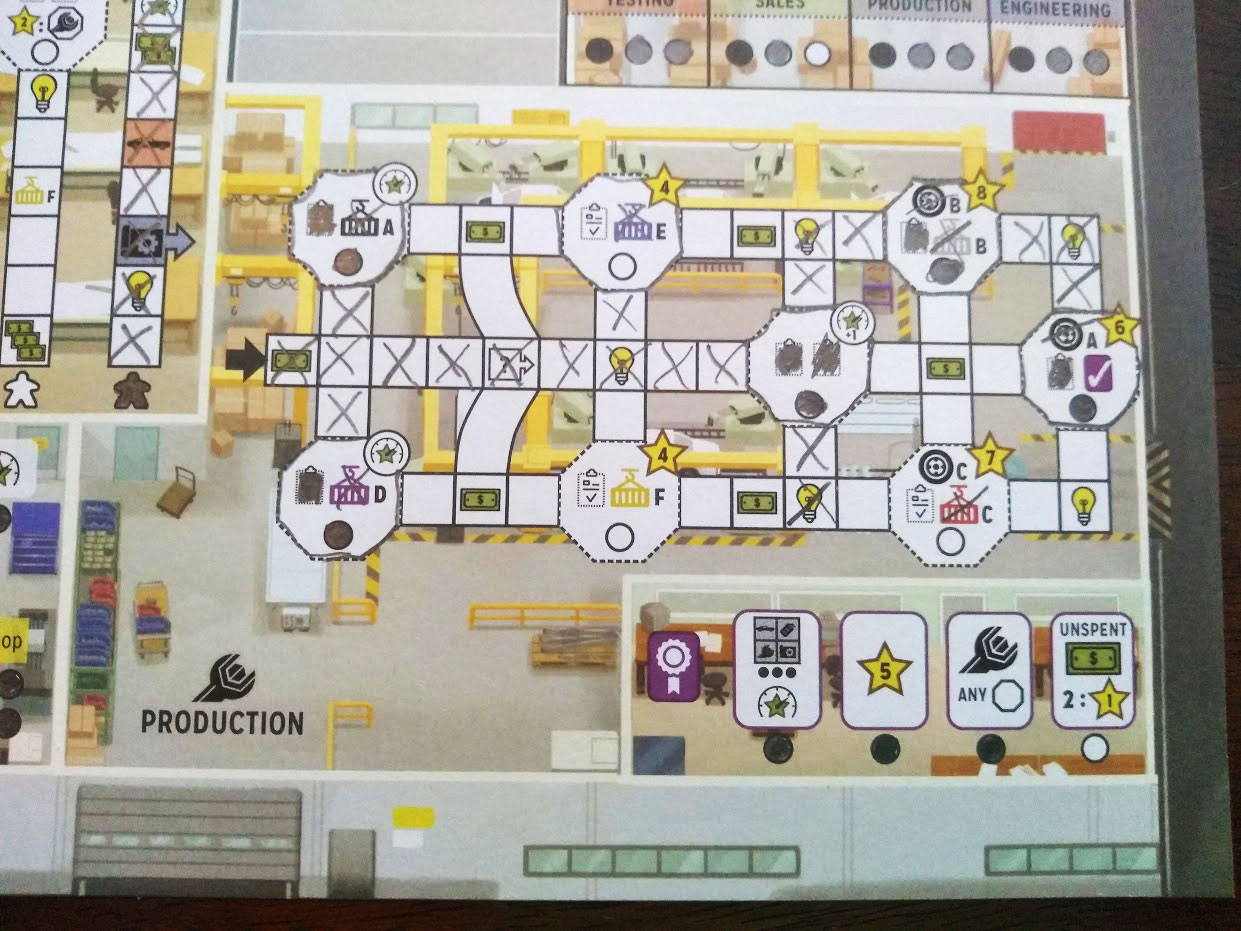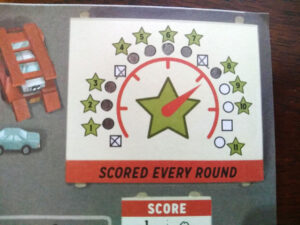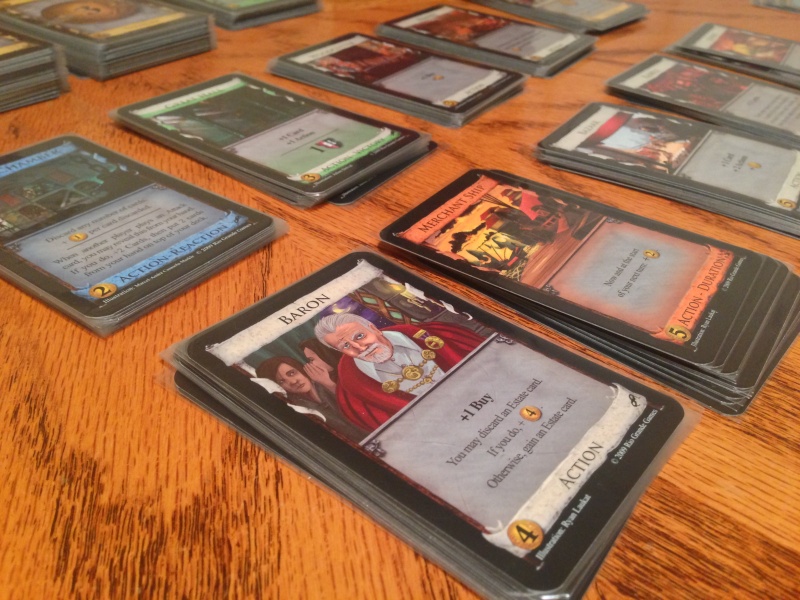 Currently, one of my favorite series of games is the steady stream of solid roll-and-writes designed by Matt Riddle and Ben Pinchback. If you’ve paid attention to our Quest Lists, you might have noticed that I tend to drop these games in from time to time. A year ago, Three Sisters was my favorite game of the first half of 2022 and it also served as my entry for the recent best roll-and-write list. Motor City was my most anticipated game for 2023. Did it live up to expectations or have Ridback finally crashed and burned?
Currently, one of my favorite series of games is the steady stream of solid roll-and-writes designed by Matt Riddle and Ben Pinchback. If you’ve paid attention to our Quest Lists, you might have noticed that I tend to drop these games in from time to time. A year ago, Three Sisters was my favorite game of the first half of 2022 and it also served as my entry for the recent best roll-and-write list. Motor City was my most anticipated game for 2023. Did it live up to expectations or have Ridback finally crashed and burned?
Motor City is a roll-and-write from Motor City Gameworks and 25th Century Games, designed by Riddle, Pinchback, and Adam Hill, for 1-5 players and plays in about 45 minutes.
Gameplay Overview:

Much like earlier games in the series, Motor City has players drafting dice and using them to perform actions in various sections of their two player sheets. The dice this time have custom faces corresponding to the different departments where you’ll be checking off boxes to advance along tracks. At setup, you’ll be able to choose a test car from one of three available testing tracks and an engineer from the six engineering tracks. When the dice are rolled, they’ll be sorted and placed onto a blueprint board that is divided into the four major departments. Players will draft dice until each has chosen two and carried out all associated actions.
When taking a die, players will first gain a printed bonus from the blueprint space that the die occupied. Then, they can choose to take the action on the die face, use the die to upgrade that action, or mark a space on the research track. Lastly, the die is placed on the player’s scoresheet to trigger one of the four main department actions.

In the Engineering department, tracks will provide various bonuses such as money, research, and shipping crates. You can also unlock free action upgrades in this area. For some tracks here, once maxed out, you’ll unlock an endgame scoring opportunity based on progress in other departments. Production serves primarily as a source of endgame points, with various hubs that require TPS reports and shipping crates to activate. Testing is where you’ll advance your cars along test tracks to gain bonuses and unlock things like shipping crates for the Production department. The end of each of these tracks yields victory points if you reach it. Finally, the Sales department represents money that can be spent to purchase upgraded basic actions and new cars for the test tracks. Here, you’ll also be able to unlock bonuses that help in other areas, such as research and potentially powerful Certifications.
Once players have finished drafting, there will be one die left, which all players can use to take the corresponding action. Then comes the Audit Phase, where you’ll score points based on how far you’ve advanced your Speedometer. The final step of the round is to roll the auditor die, determining which of the four department actions will be unavailable on your scoresheet when placing drafted dice in the next round.
Once players have progressed through eight rounds, final scores will be tallied and, as usual, the most victory points will determine the winner.

Game Experience:
While elements of Motor City will be familiar to anyone who’s played Fleet: The Dice Game or Three Sisters, there are some new mechanisms at play. For instance, the points-generating Speedometer provides some interesting choices during the game. When you take this action, you mark off a space on the Speedometer track; the further along you are, the more points you’ll earn at the end of each round. Obviously, the earlier you commit resources to filling up the Speedometer, the more points it will produce throughout the game.
Conversely, in the late game, another advance along this track will only yield a point or two, so perhaps going out of your way isn’t worth the effort at that juncture. When drafting dice from the blueprint, one of the die faces corresponds to this action. However, none of the spaces in this column have printed bonuses, so you’ll be forgoing a free perk like cash or TPS reports in favor of points. I’ve found that nearly half of a player’s endgame points come from the Speedometer, so it’s certainly prudent to invest in this area.

Another new feature is the ability to upgrade the four main department actions. At the start of the game, each time you take one of these actions, you’ll mark off one space along a track in the relevant department. But if you really want to get a lot done in your auto factory, those actions will need a little fuel injection. When drafting a die, instead of carrying out the action printed on its face, players can pay cash to upgrade that action to level 2 or 3 (in that order). From then on, they can mark off 2 or 3 spaces when taking that action, whether via die selection, scoresheet placement, or other bonus granting a free action. Some intriguing decisions lie in choosing which actions to upgrade and when to do so. Upgrading your actions early is critical to revving your engine and getting the most out of each turn. Crossing off 3 boxes in a single action, potentially collecting several bonuses all at once, is quite satisfying and certainly worth the investment.

If you’ve played previous entries in this series, you will recognize the utility of the R&D department, where collected lightbulb icons allow you to mark off research spaces. Much like the Coin track in Fleet: The Dice Game and the Goods track in Three Sisters, research is the primary source of free actions in Motor City. For every third research space checked off, you can take one of the four department actions at its current level. Another possibility for the gained free action is to spend it on one of three shop actions, which can earn you things like a new engineer or an advance on the Speedometer.
However, in particular contrast to Three Sisters, the potential for epic combos triggered by multiple free actions is not as strong. One of my favorite aspects of the backyard gardening game is that you can frequently chain together numerous actions, often fueled by the bonus actions provided by the Goods track. In Motor City, though, you’ll be ping-ponging between the various departments less frequently. While I prefer the wild combos, I can see how some players will appreciate the fact that in this game, players are less likely to have to wait around for someone else to finish up their extended combotastic turn.
Final Thoughts:
Motor City settles into good company with the other games in this series, soon to include the recently Kickstarted French Quarter. These designers have managed to take several intriguing and little-used themes, wrap them around solid game design, and put out hit after hit. There’s just enough in common between the games in the series to make each entry comfortingly familiar. But all three games have their own unique mechanisms, strategies, and quirks. Thematically, Motor City is my favorite of the bunch. There’s something very enjoyable about testing and producing muscle cars, however abstracted the process may be. However, the gameplay of Three Sisters is stronger; I found myself wishing for that gardening game’s more exciting combos. In any case, Motor City is a lot of fun and definitely worth playing for anyone who enjoys a more thinky roll-and-write.
Final Score: 4 Stars – Plenty of horsepower in another strong roll-and-write from Riddle and Pinchback.
 Hits:
Hits:
• Solid gameplay and interesting choices
• Upgraded actions feel powerful
• Cool theme
Misses:
• Fewer exciting combos than the previous entry in the series






















